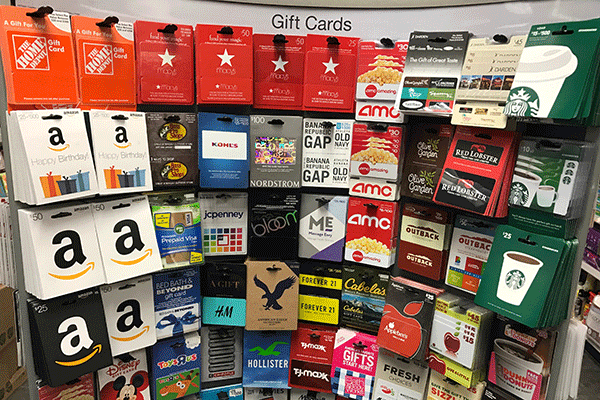
Gift cards remain a popular item during the holidays, and fraudsters take advantage and reap millions of dollars from unsuspecting consumers.
Since gift cards are sold everywhere, from grocery stores to retailers, they are often easy last-minute gifts.
And because scamming gift cards is not very challenging, it is a common fraud and increases during Christmas, Timothy Morris, chief security adviser at Tanium, the Kirkland, Wash., provider of converged endpoint management, told TheStreet.
For scammers it's as simple as urging people to buy and send them gift cards.
“During the holidays, there has traditionally been an uptick in this activity,” he said. “Criminals aren’t known for wasting time on what doesn’t work, and unfortunately this scam is relatively easy to execute, making it quite common.”
Gift-card scams are one of the most prevalent cyberthreats, beginning as so-called phishing attacks in which cybercriminals pose as legitimate businesses or government agencies, Darren Guccione, chief executive of Keeper Security, the Chicago provider of cybersecurity software, told TheStreet.
The scammers also use fear, threats and lies to persuade and coerce their victims into purchasing gift cards.
“Scammers don’t discriminate, and people of all ages fall prey to these schemes, costing consumers hundreds of millions of dollars each year,” Guccione said.
How Do Cyberscammers Work?
Since many people equate giving gift cards with giving cash, it can be much easier to deceive people into responding to what appear to be legitimate and urgent requests from friends or loved ones by purchasing one for them, Morris said.
One tactic cybercriminals use often is persuading people that a situation is serious and money is needed soon.
But no one should send a gift card without being sure that the recipient is indeed someone they know or an organization they want to help.
“The best advice is to understand that because of the anonymity of the cards, they are susceptible to scams and it’s important to stay alert,” he said.
All gift-card scams play on victims' emotions -- such as fear or excitement -- to “elicit action quickly before the victim has time to think,” says Patrick Harr, CEO at SlashNext, the Pleasanton, Calif., anti-phishing company.
Gift cards are almost perfect as a criminal-friendly cash equivalent and are difficult to track, Casey Ellis, chief technology officer at Bugcrowd, the San Francisco specialist in crowdsourced cybersecurity, told TheStreet.
“They are nonrefundable, not designed for tracing, can be sent and spent over the internet instantly and are inherently solvent,” he said.
Scammers also use gift cards to pressure people to buy them. They then convert the money they receive into cryptocurrencies, which are designed not to be traceable.
“As a bonus, gift cards have a low barrier to entry,” Ellis said. “It’s easier for a scammer to explain how to go to the local grocery store than it is to convince someone to sign up and use a cryptocurrency exchange. I also think these scams are so popular because they are cheap.”
How to Avoid Gift-Card Scams
-- Avoid responding quickly
Instead “step back and truly assess the situation,” Morris said. “Ask yourself, 'why am I being pressured to do this?' What caused it, can it be verified? Any legit request for money would be direct, and you could verify by contacting the institution.”
Since many scammers use texting to defraud people, make sure you know the sender before you react.
Texting or SMS messages are cheap to send in bulk, and once a response is received, a scam agent can engage the victim, Elllis said.
Using texting to steal someone’s personal information such as credit card numbers can be inexpensive and quick.
“Overall the response rate can be quite low and still generate a good return on investment for the bad guys,” he said.
“In general, treat anything that comes in from the internet or via phone or SMS, which asks you to spend money on gift cards or vouchers, as probably fraudulent,” Ellis said.
A request could claim to be from someone you know, such as a friend, boss, colleague or family member, and you may feel the urge to help them.
Instead, pause for a moment and “reach out to that person using a communication method you are both familiar with by calling, using social media messaging or even texting from a number you have saved,” he said.
“If you can’t positively confirm it’s them, it’s a scam,” Ellis said.
-- Never click suspicious links or open unfamiliar email attachments. Those are common tactics fraudsters use, Guccione said.
“Do not provide personal information to a stranger and avoid engaging with any unsolicited message,” he said. “In lieu of clicking a link within an email, go directly to the organization’s website instead.”
-- Always read the details of any unsolicited message.
“We tend to believe what we see, which is why aesthetics and user interface often trump awareness of a nefarious and incorrect URL,” Guccione said.
“The key is to ensure the URL matches the authentic website. When a password manager is used, it automatically identifies when a site’s URL doesn't match what’s contained in the password vault. This is a critical tool for preventing the most common attacks, including phishing scams.”
If You're a Scam Victim, You Have Few Options
Since gift cards operate in a fashion similar to that of cash, once they’re gone, there is typically no way to recover the money.
In some instances, you can contact the card issuer if you kept the card information, Morris said.
“Realistically, however, the chances of recovering your money are highly unlikely,” he said. “Never give gift card or PIN numbers over the phone or email, which activates the cards to be spent.”
Cybercriminals are always “looking for quick and easy wins that result in considerable profit with a low degree of risk and effort,” Michael DeBolt, chief intelligence officer at Intel 471, the Wilmington, Del., provider of cyberthreat intelligence, told TheStreet.
“The end-of-year holiday period presents a unique window of opportunity for threat actors to increase illicit profits due to the surge in online activity as retailers and consumers transact goods and services, log into online accounts, ship and receive products,” he said.
Season's Savings!
It’s time to take your financial future into your own hands. Level up your investing knowledge when you save $300 on our most comprehensive investing product.







